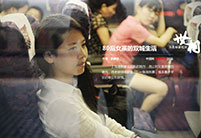 Lingerie show at 2014 Miss China
Lingerie show at 2014 Miss China
 Fan Bingbing's "Queen style" in new play
Fan Bingbing's "Queen style" in new play
 Top 10 pricey destinations for studying abroad
Top 10 pricey destinations for studying abroad
 Couple chase tornados to create perfect storm photos
Couple chase tornados to create perfect storm photos
 J-10 fighters show aerobatic stunts in smog-free sky
J-10 fighters show aerobatic stunts in smog-free sky
 Top 10 charming female soldiers of the PLA
Top 10 charming female soldiers of the PLA
 Charming contestants of Shanghai Int’l Model Contest
Charming contestants of Shanghai Int’l Model Contest
 Most amazing chi-pao beauties
Most amazing chi-pao beauties
 7 deadly animal attacks
7 deadly animal attacks
 Picturesque autumn scenery of Hongshan Army Horse Ranch
Picturesque autumn scenery of Hongshan Army Horse Ranch
BRASILIA, Oct. 23 -- Brazilian presidential candidates have to face up to the country's economic slowdown during their campaigns ahead of the run-off on Sunday.
Analysts said the most convincing proposals for reviving the economy could be the key to the race, after the International Monetary Fund earlier this month cut its 2015 growth forecast for Brazil by 0.6 percentage point to 1.4 percent and lowered its 2014 growth forecast to 0.3 percent from 1.3 percent.
Social Democrat challenger Aecio Neves believed the current government led by President Dilma Rousseff has abandoned the so-called "macroeconomic triad" of monetary, fiscal and exchange rate discipline that Brazil put in place in the mid-1990s and reinforced in the following decade.
Neves has pledged to bring inflation below the 4.5 target in the medium term from the current rate of nearly 6.4 percent, and take such measures as austerity and tax reforms.
Neves' main campaign message has been that a change in government will boost the business sector and consumer confidence, leading to resumed growth in 2015 that will be in turn reinforced by a return to fiscal austerity and a more aggressive anti-inflation policy.
Neves also accused Finance Minister Guido Mantega of using "creative accounting" to conceal fiscal problems and of being too soft in fighting inflation.
Rousseff, who is seeking a second four-year term, pointed out that Brazil's current unemployment is at its lowest level of 5 percent, and the minimum wage is adjusted annually to keep up with inflation and reflect economic growth to guarantee the purchasing power of Brazil's workers.
She has pledged to reform the tax system, revamp her treasury team, and promote domestic consumption, arguing that Brazil's slower growth is the result of lower external demand due to the international economic crisis.
Rousseff's economic team said that this year's higher inflation rate was sparked by shortages resulting from drought in parts of the country.
The campaign team accused Neves of planning a return to the fiscal policies implemented by the Social Democratic government of Fernando Henrique Cardoso between 1995 and 2003, which raised interest rates to fight inflation, and at the same time benefit the financial sector.
The incumbent's camp also defends its implementation of the macroeconomic triad, forecasting that this year's fiscal surplus, projected to be between 0.5 and 1 percent of gross domestic product (GDP), can be increased next year to between 2 and 2.5 percent of GDP.
Rousseff is confident that as from next year, the economy will begin to feel the results of major infrastructure investment made this year in airports, ports and highways.
The government has built the foundations for a "new cycle of development," thanks to significant investment in the energy sector through state-owned banks, Rousseff's camp has said.
 Fast and Furious: Post-85s female pilots and their mission
Fast and Furious: Post-85s female pilots and their mission Century-old public bath closes door in Beijing
Century-old public bath closes door in Beijing A post-80s girl's tale of two cities
A post-80s girl's tale of two cities Shocking! Photos of Chinese fighters revealed
Shocking! Photos of Chinese fighters revealed World's most intimidating nuclear weapons
World's most intimidating nuclear weapons Standard faces for each countries in the world
Standard faces for each countries in the world Netizens fall in love with champion swimmer Ning Zetao
Netizens fall in love with champion swimmer Ning Zetao Vibrant 21-year-old and her own Cheongsam brand
Vibrant 21-year-old and her own Cheongsam brand Fashion style: Faye Wong vs Cecilia Cheung
Fashion style: Faye Wong vs Cecilia Cheung Top 10 most dangerous jobs in the world
Top 10 most dangerous jobs in the world  Top 10 fifth generation jet fighters in the world
Top 10 fifth generation jet fighters in the world Top 10 Chinese goddesses
Top 10 Chinese goddesses  Top 20 hottest women in the world in 2014
Top 20 hottest women in the world in 2014 Top 10 pure beauties in showbiz
Top 10 pure beauties in showbiz  Top 10 world's highest-paid models 2014
Top 10 world's highest-paid models 2014 The most gorgeous Chinese women
The most gorgeous Chinese women Top 10 most handsome faces in Asia
Top 10 most handsome faces in AsiaDay|Week|Month